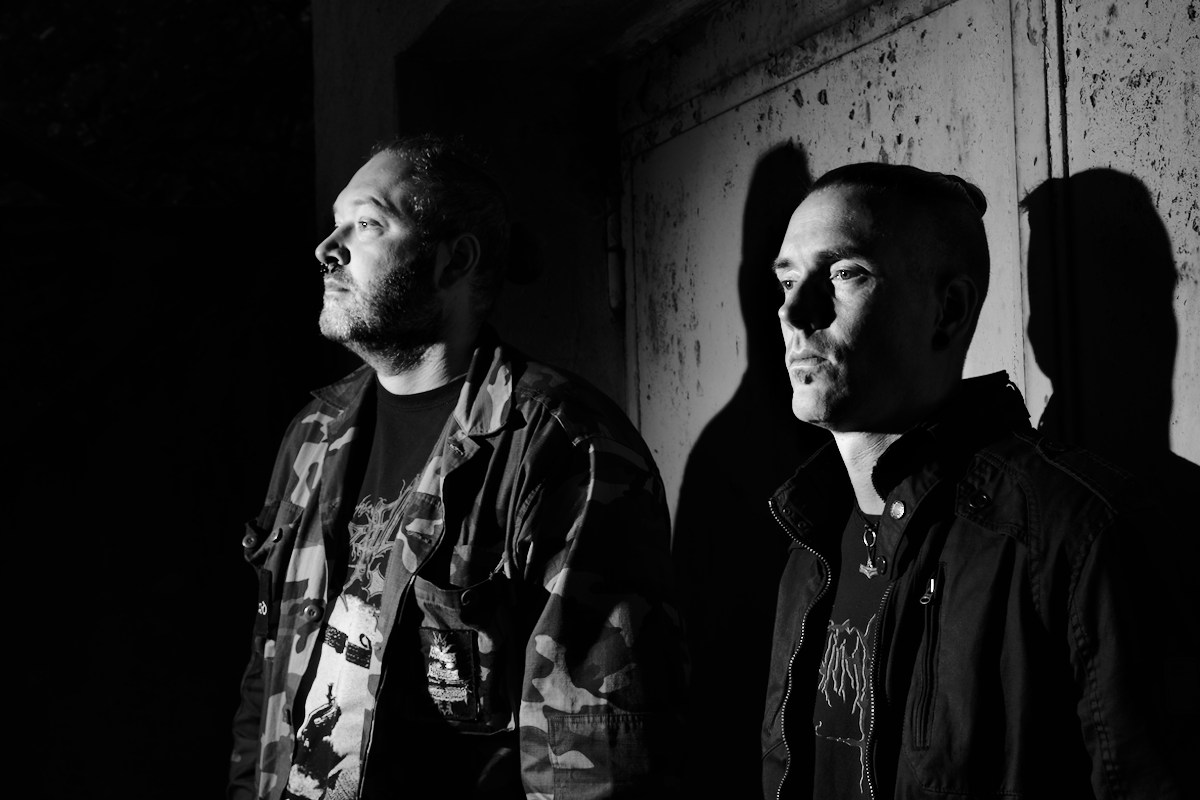
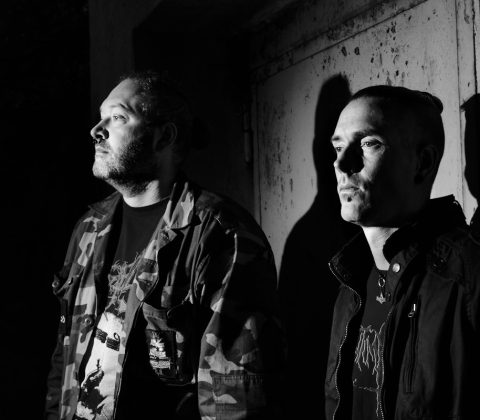
Interview with Schädel about their album „Erosion des Willens”
Is it a band, a music project? What is the intention behind Schädel? Schädel comprises two guys I’ve known for a long time. They were part of a very active generation of musicians in my hometown of Guben since the mid-90s. They harnessed the spirit of the time to express their creativity. This spirit meant, above all, having no boundaries musically and in their stage performances, while also adapting to the available resources.
B.Lizzart and Smerth, the names of the protagonists, are no longer based in my neighborhood, but we still meet occasionally for various musical skirmishes. After I digitally acquired their new album “Erosion des Willens” on Bandcamp earlier this summer and found myself captivated by the duo’s music, just as I was by their 2021 EP “Schwarz mein Meer” I wanted to pull some answers to my questions out of this bony nostrils, so, we met in my music room for an interview some time ago.
Before I describe how the new Schädel triggered my musical synapses:

I.„Feindberührung,“ begins with a siren-like solitary lead guitar that we’ll hear throughout the song. A powerful riff follows, setting the right tone. The forceful drums join in quickly, creating a vigorously fast-paced song with cool breaks that give air to breath to the bass and occasionally an acoustic guitar.
II.„Totale Distanz“ starts with classic, somber black metal that leans on the main riff, alternating with bursts of frenzy.
- Popper: Clearly, we’re hearing music that corresponds to a band structure. So, I had to ask my guests here: Is Schädel a band, a band project, or a musical project?
- B.Lizzart: Well, it’s definitely a project. We can’t really be a band since we’ll never play live.
- Popper: So, that’s pretty much decided?
- B.Lizzart: That was the condition for us. We’re doing this primarily for ourselves, for the sake of music, you know? We actually started another project called Berserkerzorn, where we detached ourselves from others. Because the fewer people are involved, the more precise the music can be.
- Popper: When and how did you start then?
- Smerth: Actually, it goes back to 2014, but at that time we didn’t have specific plans. And until it was clear if anything would come out of it, we didn’t announce the project. It was clear that B.Lizzart wanted to make music again, and it was clear that it should be black metal. There were also configurations for the project as a trio, but everything was set up for online collaboration.
III. “Strebe zum Licht” starts with blistering black metal that slows down with the introduction of vocals. I often enjoy the way the lyrics are presented – a task that can be tricky in this genre with German lyrics. The slightly synthetic outro adds a nice atmosphere to the end of the song.
IV. In “Leuchtfeuer” initially, steadfast guitars saw away at the intro before handing the song over to a very cool stomping black metal part. The vocals in the following faster middle part, for my taste, occasionally have sections that don’t quite fit perfectly into the rhythm (as mentioned above). The closing section is rightly derived from the beginning, leaving a great impression!
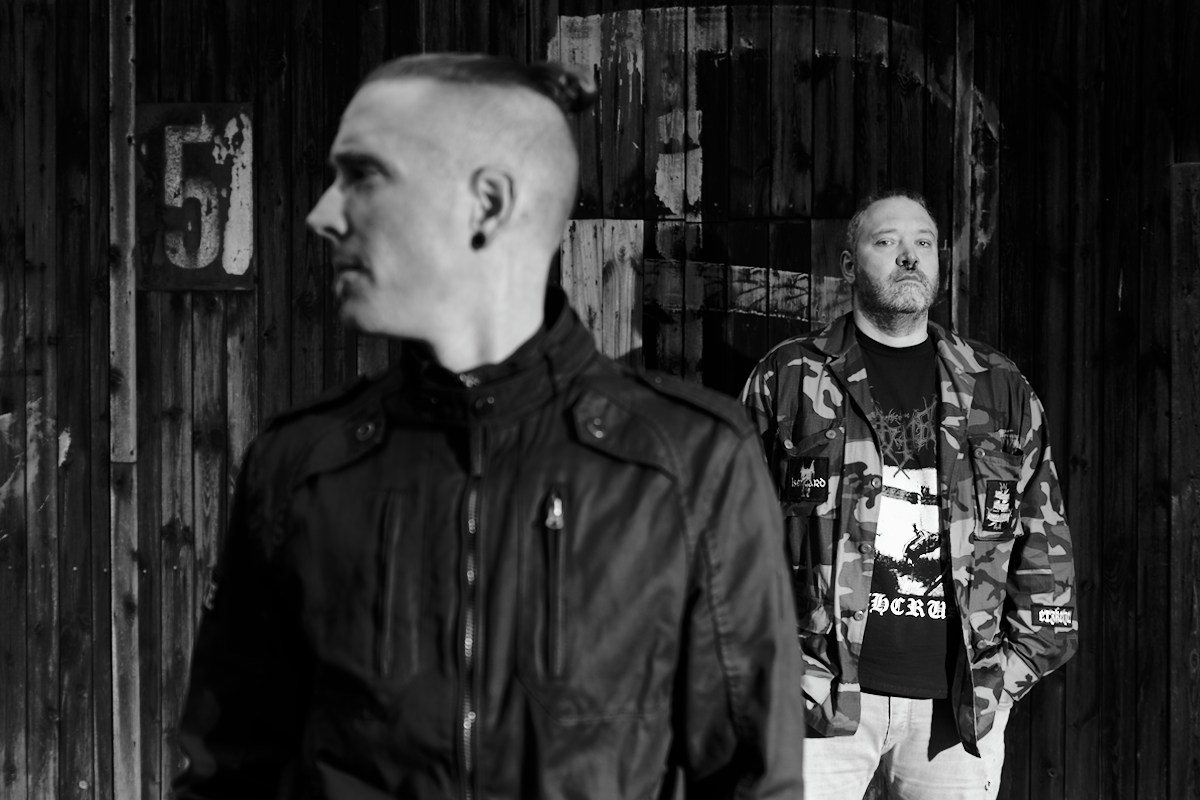
- Popper: As I’m also describing the lyrics in the songs, what can you tell us about the name Schädel? What was the intention behind the band name?
- Schädel: Short and memorable. And it should be in German, since we have German lyrics. It’s also somewhat neutral. We have a song – „Absolute Gottferne“ – that was also considered, but with that, you’re fitting everything into a schema. Schädel is much broader and leaves more room.
- Popper: Smerth, in “Leuchtfeuer” there’s a passage: “… Es gibt kein Gott, Erhebt euch! Keine Narben mehr!” Is it a reference to “Sei Gott” by Antimensch, given the similar lyrical theme and the band where you used to be the drummer?
- Smerth: Hehe, no, B.Lizzart mentioned that too, but it has nothing to do with that. We might have used the same words, but the content is pretty clear, isn’t it? The text is not meant to be taken personally.
- B.Lizzart: It’s actually the only text on the record that – let’s say – can be seen as socially critical. In general, I’m really impressed by Smerth’s lyrics – I mean, I’ve known him for a long time through the music we make together, and I didn’t know he could do something like this. Lyrics are quite a challenge, as all the involved musicians need to identify with them.
V. The doom-laden guitars in the intro of„Niedergang der Morgenröte“ are propelled forward by the appropriate vocals and double bass lines. In the second part, the leads kick in, and the vocals descend significantly, creating a pleasant contrast to the first part.
VI.“Tanzlied des Totenschiffs“ already impressed me upon the first listen. One, due to the song’s heartfelt frenzy, and two, the lyrics blew me away. Given the other good lyrics, it wasn’t expected that this one, uniquely, wasn’t written by Smerth. The song is divided into three parts: frenzy-andante-frenzy, and it’s one of my favorite songs on“Erosion des Willens.“
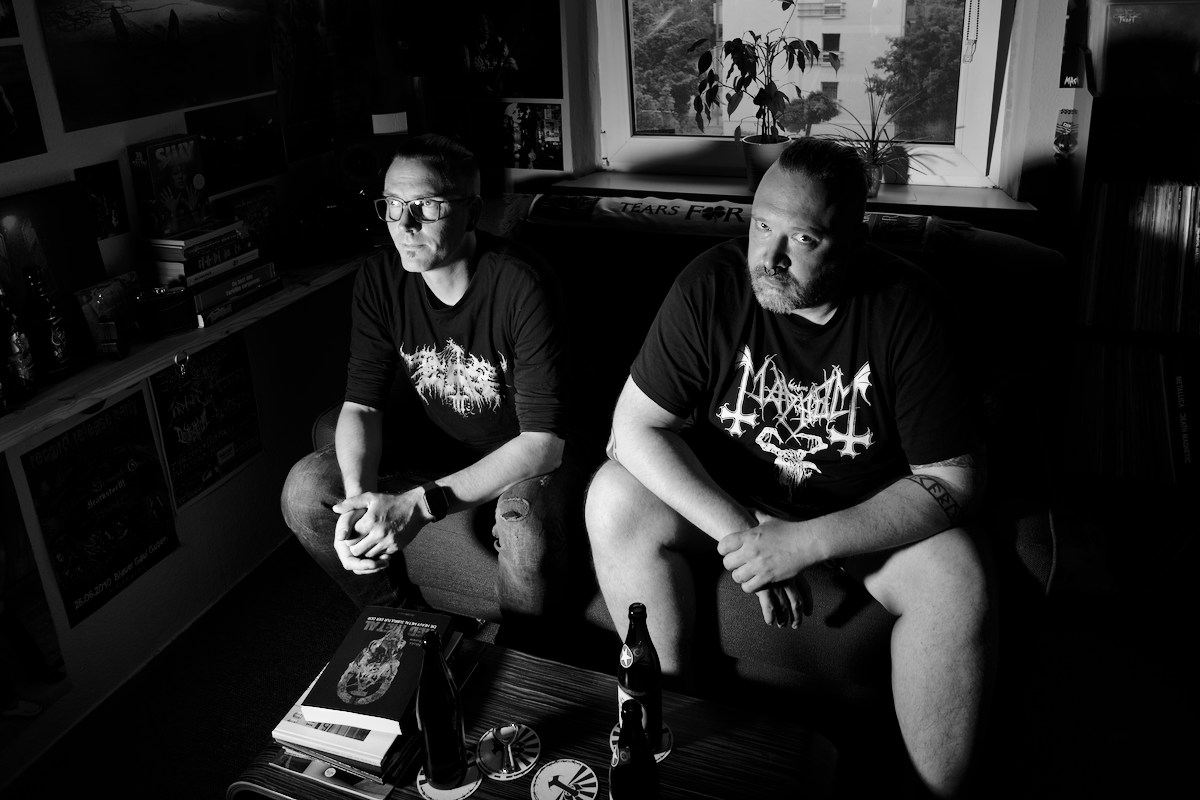
- Smerth: Do you know the lyrics? There’s a DDR (German Democratic Republic) band that used them before: Freygang.
- Popper: Well, I do know Freygang and like them, but I didn’t notice that.
- B.Lizzart: Freygang “only” set it to music, the lyrics come from a certain Bruno Traven and his 1926 work “Das Totenschiff”
- Popper: So, what’s the creative process behind Schädel’s music?
- Smerth: So, everything musical, the instruments, etc., is B.Lizzart’s thing, and the lyrics are my side, as well as how the vocals are layered. The interesting thing about „Schwarz mein Meer“ was that I recorded it in Hannover. B.Lizzart had no control over that (laughs), so he basically received the finished tracks. As it was decided that I wouldn’t physically play the drums and that I would do the vocals, I realized that I had to write the lyrics. That took a while, as I can’t write lyrics on demand.
- B.Lizzart: We didn’t even know you could write lyrics! We only found out once we had a few texts (laughs).
- Popper: Do the lyrics on „Erosion des Willens“ reflect your current state of mind? Probably not as often as an album might suggest – where do you draw inspiration for your lyrics?
- Smerth: The lyrics are from a challenging time. So, for this album, I wrote them all at night or in the early morning, whenever. They’re partly personal but also observations from a dark period of my life, a very dark period.
IV.The first spoken verses of„Tränen des sterbenden Scheusals“ remind me somehow of Rammstein’s phrasing in„Ich will“ Even the song structure, to some extent, could make me think of it – just a coincidence, probably. By the halfway point of the song, the offered intensity and speed should silence any doubters.
- Popper: So far, you’ve only released digitally on Bandcamp. Will that change in any way?
- Smerth: That would be nice

- B.Lizzart: Well, I want to make a CD digipack at first, but there would need to be demand for it and a label that might want to release it.
- Popper: So, what’s the status? Do you have anything?
- B.Lizzart: We don’t have anything yet. We won’t have anything because we haven’t looked into it yet (laughs).
- Smerth: Seriously, we don’t know anyone.
- Popper: Releasing through the YouTube channel „Black Metal Promotion“ must be considered a success, right?
- Smerth: Yes, of course, that was cool, and the feedback was great. We wouldn’t reach people any other way, especially since we don’t play live.
- Smerth: (addressing B.Lizzart) You say categorically, no?
- B.Lizzart: Well, the question earlier was whether we intended to, and we didn’t
 I never wanted to play live, ever. Because, I must say, if you hand me a guitar right now, I can’t play a single song!
I never wanted to play live, ever. Because, I must say, if you hand me a guitar right now, I can’t play a single song! - Smerth: CUT! (laughs)
- B.Lizzart: No, it’s really like that, and I don’t mind. It’s more like I come up with a song and finish it. Then I can play it for that time – like memorizing a poem in school – I can do it for that time, and then I let it go again.
- Popper: Maybe it’s because there’s no reason in your consciousness to remember the song.
- B.Lizzart: Exactly, it’s a closed thing for me.
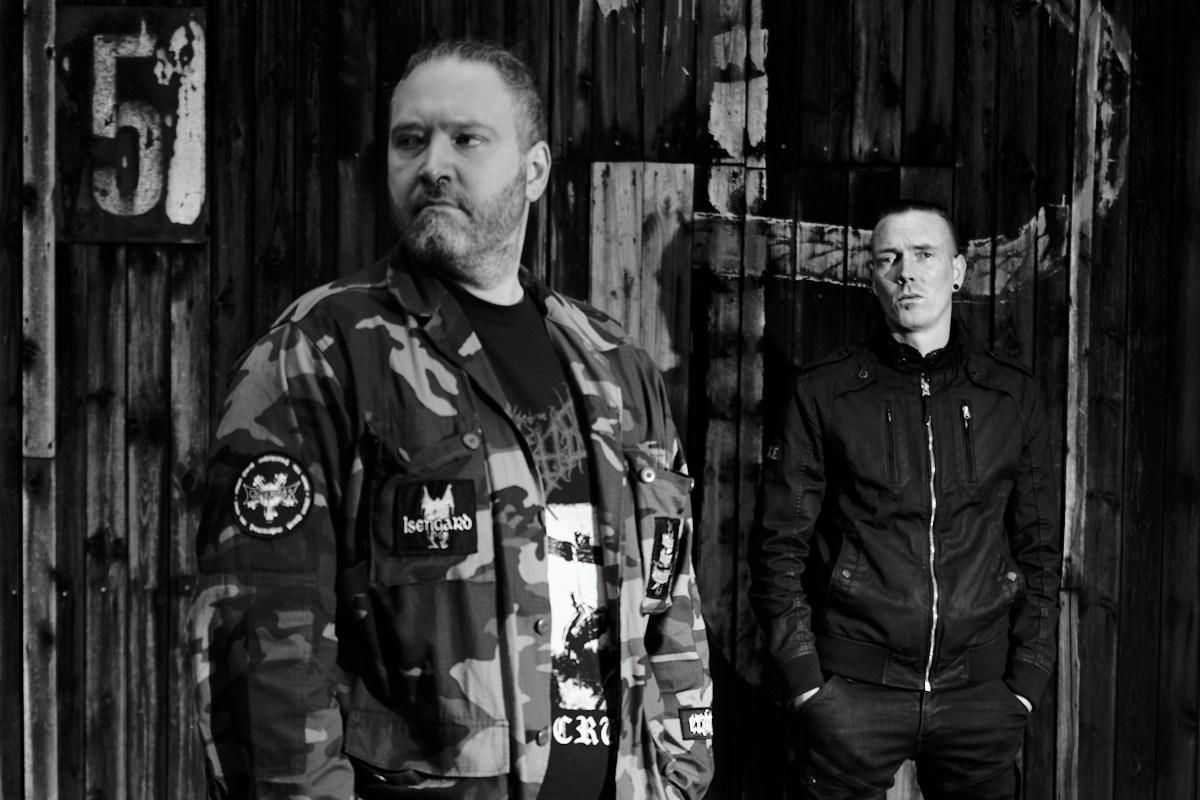
VIII. The album ends with “Vita reducta,” a song that thrives on its instrumentational and vocal complexity. We hear dual normal voices, as well as vicious black metal eruptions with guitar speed and double bass drumming. The song dissolves into the mystical theme of the intro at the end. Top-notch!
- Popper: Are you both singing there?
- B.Lizzart: That’s Smerth, with two recorded voices.
- Smerth: It was accidental how it came about. There was this part, but not with two voices.
- B.Lizzart: Although I had my concerns because, initially, I heard it pure and wasn’t sure, also because of the German language, as everything is so understandable. It was difficult otherwise to hold back I wanted to say something about how you were singing (referring to Smerth, note by Popper), but then I thought: No, that’s his part, and he has to do it alone.
- Popper: Did you ever think: I’ve already done enough on the album, or I won’t interfere because it’s not appropriate?
- B.Lizzart: Nah, because then it wouldn’t be our project – our joint project.
- Popper: Finally, in our little interview, I’d like to talk about the cover and layout. B.Lizzart, you created everything yourself, without AI? (The background here is that B.Lizzart, as a graphic designer, is currently increasingly involved with AI-generated images, note by Popper)
- B.Lizzart: Without AI, everything is still fully rendered in 3D, the entire video for “Feindberührung,” and I created the cover and layout from that. It was just as time-consuming as making the entire record, I worked on it for three months.
- Popper: Truly impressive and definitely worth seeing! If you haven’t seen it yet, what are you waiting for!
- B.Lizzart: I wanted to create something in the style of theater plays, an appearance, and impact like a stage set.
- Popper: Like when they sometimes walk around on stilts and in long robes?
- B.Lizzart: Yes, that’s exactly the idea, just dark.
- Popper: But there’s no direct connection between the video and the song lyrics, right?
- B.Lizzart: That’s an interesting question, we actually wanted to leave that open.
- Smerth: (grinning)
- B.Lizzart: He (Smerth) showed me the lyrics, and I didn’t immediately understand what it was about. It’s also a matter of interpretation. When I started with the visual elements, and Smerth revealed something about the meaning, I realized, well, okay, it doesn’t fit together
 Or at least, not the way I thought. But we wanted this song as the first release along with the video.
Or at least, not the way I thought. But we wanted this song as the first release along with the video. - Popper:
 And how did you resolve the conflict?
And how did you resolve the conflict? - B.Lizzart: In the end, we decided to bring both together anyway. Why does everything always have to be clearly outlined? I think it’s much more exciting for the listener or viewer to be able to interpret it themselves. And that’s a good thing.
I hope that this brief insight into the music project Schädel has sparked interest in their music for the curious reader. Schädel joins the illustrious ranks of those who create music for the sake of music with “Erosion des Willens” – even if that might mean not making much progress. And here, there seem to be two hearts in the chests of the two musicians. One heart ambitiously beats solely for the music, and the other, not quite as agile, beats for a presence in the music scene (whether through physical releases or even live performances). For me, both fit, and a visit to Schädel’s Bandcamp profile is highly recommended.
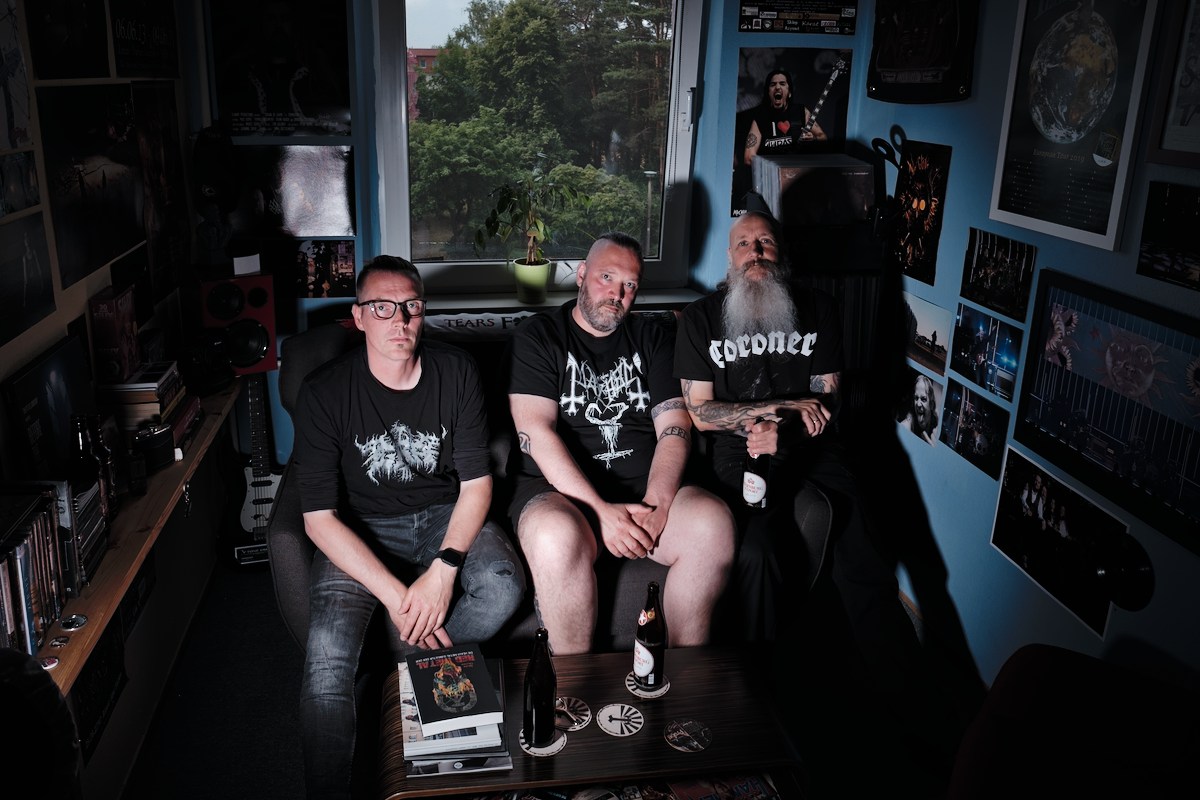
One Comment
Comments are Disabled
[…] English version here: […]